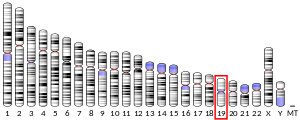CEACAM5
Carcinoembryonic antigen-related cell adhesion molecule 5 (CEACAM5) also known as CD66e (Cluster of Differentiation 66e), is a member of the carcinoembryonic antigen (CEA) gene family..[3]
See also
References
Further reading
- Willcocks TC, Craig IW (1991). "Characterization of the genomic organization of human carcinoembryonic antigen (CEA): comparison with other family members and sequence analysis of 5' controlling region". Genomics. 8 (3): 492–500. doi:10.1016/0888-7543(90)90036-T. PMID 2286372.
- Barnett T, Zimmermann W (1990). "Workshop report: proposed nomenclature for the carcinoembryonic antigen (CEA) gene family". Tumour Biol. 11 (1–2): 59–63. doi:10.1159/000217643. PMID 2309067.
- Schrewe H, Thompson J, Bona M, et al. (1990). "Cloning of the complete gene for carcinoembryonic antigen: analysis of its promoter indicates a region conveying cell type-specific expression". Mol. Cell. Biol. 10 (6): 2738–48. PMC 360634. PMID 2342461.
- Kamarck ME, Elting JJ, Hart JT, et al. (1987). "Carcinoembryonic antigen family: expression in a mouse L-cell transfectant and characterization of a partial cDNA in bacteriophage lambda gt11". Proc. Natl. Acad. Sci. U.S.A. 84 (15): 5350–4. doi:10.1073/pnas.84.15.5350. PMC 298853. PMID 2955415.
- Zimmermann W, Ortlieb B, Friedrich R, von Kleist S (1987). "Isolation and characterization of cDNA clones encoding the human carcinoembryonic antigen reveal a highly conserved repeating structure". Proc. Natl. Acad. Sci. U.S.A. 84 (9): 2960–4. doi:10.1073/pnas.84.9.2960. PMC 304780. PMID 3033671.
- Barnett T, Goebel SJ, Nothdurft MA, Elting JJ (1989). "Carcinoembryonic antigen family: characterization of cDNAs coding for NCA and CEA and suggestion of nonrandom sequence variation in their conserved loop-domains". Genomics. 3 (1): 59–66. doi:10.1016/0888-7543(88)90160-7. PMID 3220478.
- Zimmermann W, Weber B, Ortlieb B, et al. (1988). "Chromosomal localization of the carcinoembryonic antigen gene family and differential expression in various tumors". Cancer Res. 48 (9): 2550–4. PMID 3356015.
- Beauchemin N, Benchimol S, Cournoyer D, et al. (1987). "Isolation and characterization of full-length functional cDNA clones for human carcinoembryonic antigen". Mol. Cell. Biol. 7 (9): 3221–30. PMC 367958. PMID 3670312.
- Oikawa S, Nakazato H, Kosaki G (1987). "Primary structure of human carcinoembryonic antigen (CEA) deduced from cDNA sequence". Biochem. Biophys. Res. Commun. 142 (2): 511–8. doi:10.1016/0006-291X(87)90304-4. PMID 3814146.
- Maruyama K, Sugano S (1994). "Oligo-capping: a simple method to replace the cap structure of eukaryotic mRNAs with oligoribonucleotides". Gene. 138 (1–2): 171–4. doi:10.1016/0378-1119(94)90802-8. PMID 8125298.
- Suzuki Y, Yoshitomo-Nakagawa K, Maruyama K, et al. (1997). "Construction and characterization of a full length-enriched and a 5'-end-enriched cDNA library". Gene. 200 (1–2): 149–56. doi:10.1016/S0378-1119(97)00411-3. PMID 9373149.
- Hart SP, Ross JA, Ross K, et al. (2000). "Molecular characterization of the surface of apoptotic neutrophils: implications for functional downregulation and recognition by phagocytes". Cell Death Differ. 7 (5): 493–503. doi:10.1038/sj.cdd.4400680. PMID 10800083.
- Guignot J, Peiffer I, Bernet-Camard MF, et al. (2000). "Recruitment of CD55 and CD66e Brush Border-Associated Glycosylphosphatidylinositol-Anchored Proteins by Members of the Afa/Dr Diffusely Adhering Family of Escherichia coli That Infect the Human Polarized Intestinal Caco-2/TC7 Cells". Infect. Immun. 68 (6): 3554–63. doi:10.1128/IAI.68.6.3554-3563.2000. PMC 97642. PMID 10816511.
- Boehm MK, Perkins SJ (2000). "Structural models for carcinoembryonic antigen and its complex with the single-chain Fv antibody molecule MFE23". FEBS Lett. 475 (1): 11–6. doi:10.1016/S0014-5793(00)01612-4. PMID 10854848.
- Screaton RA, DeMarte L, Dráber P, Stanners CP (2000). "The Specificity for the Differentiation Blocking Activity of Carcinoembryonic Antigen Resides in Its Glycophosphatidyl-Inositol Anchor". J. Cell Biol. 150 (3): 613–26. doi:10.1083/jcb.150.3.613. PMC 2175204. PMID 10931872.
- Bajenova OV, Zimmer R, Stolper E, et al. (2001). "Heterogeneous RNA-binding protein M4 is a receptor for carcinoembryonic antigen in Kupffer cells". J. Biol. Chem. 276 (33): 31067–73. doi:10.1074/jbc.M104093200. PMID 11406629.
- Wirth T, Soeth E, Czubayko F, Juhl H (2002). "Inhibition of endogenous carcinoembryonic antigen (CEA) increases the apoptotic rate of colon cancer cells and inhibits metastatic tumor growth". Clin. Exp. Metastasis. 19 (2): 155–60. doi:10.1023/A:1014566127493. PMID 11964079.
- Louhimo J, Carpelan-Holmström M, Alfthan H, et al. (2002). "Serum HCG beta, CA 72-4 and CEA are independent prognostic factors in colorectal cancer". Int. J. Cancer. 101 (6): 545–8. doi:10.1002/ijc.90009. PMID 12237895.
- Hampton R, Walker M, Marshall J, Juhl H (2002). "Differential expression of carcinoembryonic antigen (CEA) splice variants in whole blood of colon cancer patients and healthy volunteers: implication for the detection of circulating colon cancer cells". Oncogene. 21 (51): 7817–23. doi:10.1038/sj.onc.1205906. PMID 12420218.
- Strausberg RL, Feingold EA, Grouse LH, et al. (2003). "Generation and initial analysis of more than 15,000 full-length human and mouse cDNA sequences". Proc. Natl. Acad. Sci. U.S.A. 99 (26): 16899–903. doi:10.1073/pnas.242603899. PMC 139241. PMID 12477932.
External links
- CEACAM5+protein,+human at the US National Library of Medicine Medical Subject Headings (MeSH)
- Human CEACAM5 genome location and CEACAM5 gene details page in the UCSC Genome Browser.
This article incorporates text from the United States National Library of Medicine, which is in the public domain.
This article is issued from
Wikipedia.
The text is licensed under Creative Commons - Attribution - Sharealike.
Additional terms may apply for the media files.


